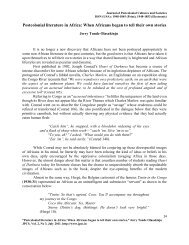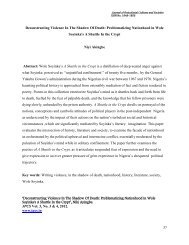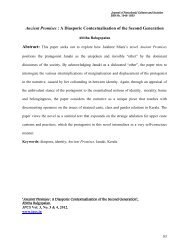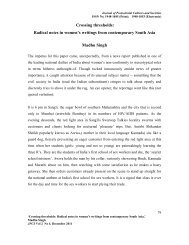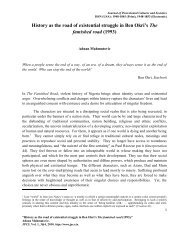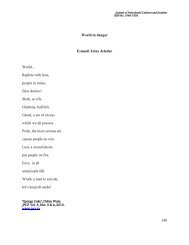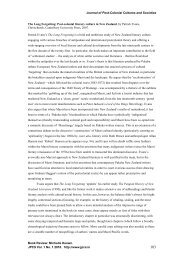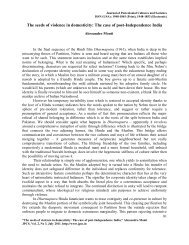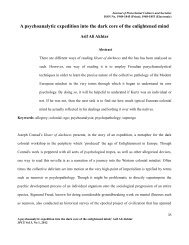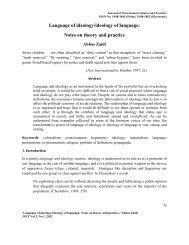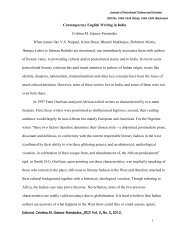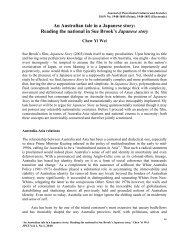Darwinist premise in the Orientalist construction of the âOtherâ - JPCS
Darwinist premise in the Orientalist construction of the âOtherâ - JPCS
Darwinist premise in the Orientalist construction of the âOtherâ - JPCS
Create successful ePaper yourself
Turn your PDF publications into a flip-book with our unique Google optimized e-Paper software.
Journal <strong>of</strong> Postcolonial Cultures and Societies<br />
ISSN No. 1948-1845 (Pr<strong>in</strong>t); 1948-1853 (Electronic)<br />
people and territories. This idea has been encapsulated <strong>in</strong> <strong>the</strong> statement <strong>of</strong> Marx and<br />
epigraphed by Said <strong>in</strong> his sem<strong>in</strong>al work Orientalism (1978) that “<strong>the</strong>y cannot represent<br />
<strong>the</strong>mselves; <strong>the</strong>y must be represented”. Hence, Orientalism was ultimately a political vision<br />
<strong>of</strong> reality “whose structure promoted <strong>the</strong> difference between <strong>the</strong> familiar (Europe, West,<br />
"us") and <strong>the</strong> strange (<strong>the</strong> Orient, <strong>the</strong> East, "<strong>the</strong>m").” (43)<br />
The Darw<strong>in</strong>ian scholastic vision <strong>of</strong> Orientalism can be easily traced <strong>in</strong> statements <strong>of</strong> <strong>the</strong><br />
Orientalsit writers. Henry Kiss<strong>in</strong>ger’s classification <strong>of</strong> develop<strong>in</strong>g countries as pre-<br />
Newtonian cultures, which cannot deal with empirical reality, that is, cultures to which ‘<strong>the</strong><br />
real world is almost completely <strong>in</strong>ternal to <strong>the</strong> observer . . .” (47). Alfred Lyall, on <strong>the</strong> o<strong>the</strong>r<br />
hand, has argued that ‘accuracy is abhorrent to <strong>the</strong> Oriental m<strong>in</strong>d . . .” (38). Hamilton Gibb<br />
has written about ‘<strong>the</strong> aversion <strong>of</strong> Muslims from <strong>the</strong> thought-processes <strong>of</strong> rationalism’,<br />
blam<strong>in</strong>g his proposition on what he calls ‘<strong>the</strong> atomism and discreteness <strong>of</strong> <strong>the</strong> Arab<br />
imag<strong>in</strong>ation’ (106). Ernest Renan had earlier dismissed <strong>the</strong> Semites as ‘an <strong>in</strong>ferior<br />
comb<strong>in</strong>ation <strong>of</strong> human nature’, and <strong>the</strong>ir languages as ‘<strong>in</strong>organic’, lack<strong>in</strong>g <strong>in</strong> <strong>the</strong> capacity to<br />
regenerate <strong>the</strong>mselves, unlike <strong>the</strong> liv<strong>in</strong>g, organic Indo-European languages (143).<br />
Chateaubriand saw <strong>the</strong> Crusades as not only ‘about <strong>the</strong> deliverance <strong>of</strong> <strong>the</strong> Holy Sepulchre’,<br />
but also as a fight aga<strong>in</strong>st a cult that was ‘civilisation’s enemy’, and whose only God was<br />
‘force’(172). Lamart<strong>in</strong>e, on <strong>the</strong> o<strong>the</strong>r hand, preached <strong>the</strong> advent <strong>of</strong> <strong>the</strong> age <strong>of</strong> European<br />
colonialism. To him <strong>the</strong> Orient was ‘nations without territory, rights, laws or security . . .<br />
wait<strong>in</strong>g anxiously for <strong>the</strong> shelter’ <strong>of</strong> European occupation (197). “The Orient,” Said remarks,<br />
“was <strong>the</strong>refore not Europe's <strong>in</strong>terlocutor, but its silent O<strong>the</strong>r” and that “as primitivity, as <strong>the</strong><br />
age-old antitype <strong>of</strong> Europe, as a fecund night out <strong>of</strong> which European rationality developed,<br />
<strong>the</strong> Orient's actuality receded <strong>in</strong>exorably <strong>in</strong>to a k<strong>in</strong>d <strong>of</strong> paradigmatic fossilization.” He has<br />
concluded that <strong>the</strong> Western dist<strong>in</strong>ction between <strong>the</strong> Occident and its different “O<strong>the</strong>r” “was<br />
constituted out <strong>of</strong> this radical difference” (Orientalism Reconsidered 93- 94).<br />
The Enlightenment rationality and <strong>the</strong> Renaissance <strong>in</strong>dividuality had been culm<strong>in</strong>ated <strong>in</strong> <strong>the</strong><br />
Victorian Darw<strong>in</strong>ism. Orientalism as a corporate <strong>in</strong>stitution was aided by those notions. This<br />
is supported by a statement <strong>of</strong> Charles Darw<strong>in</strong> himself, <strong>in</strong> his work The Descent <strong>of</strong> Man and<br />
Selection <strong>in</strong> Relation to Sex: “At some future period, not very distant as measured by<br />
centuries, <strong>the</strong> civilised races <strong>of</strong> man will almost certa<strong>in</strong>ly exterm<strong>in</strong>ate, and replace, <strong>the</strong><br />
savage races throughout <strong>the</strong> world” (99). Darw<strong>in</strong>’s notion <strong>of</strong> struggle for survival justified<br />
and legitimized <strong>the</strong> racists’ conception <strong>of</strong> superior and <strong>in</strong>ferior peoples and nations and<br />
validated <strong>the</strong> conflict between <strong>the</strong>m. It can be safely if reluctantly concluded that Darw<strong>in</strong>’s<br />
<strong>the</strong>ory clearly contributed to <strong>the</strong> death <strong>of</strong> millions <strong>of</strong> people <strong>in</strong> concentration camps, and<br />
about o<strong>the</strong>r millions <strong>of</strong> humans <strong>in</strong> wars.<br />
Once considered as an objective scientific <strong>the</strong>ory <strong>of</strong> difference with<strong>in</strong> human populations,<br />
racism has become regarded as an ideology <strong>of</strong> social dom<strong>in</strong>ation and exclusion on <strong>the</strong> basis<br />
<strong>of</strong> biological and genetic variation. To put it more simply, <strong>the</strong> biological difference justifies<br />
<strong>the</strong> dom<strong>in</strong>ance <strong>of</strong> certa<strong>in</strong> races over o<strong>the</strong>rs. Floya Anthias has observed that “racism is not<br />
just about beliefs or statements. Racism also <strong>in</strong>volves <strong>the</strong> ability to impose those beliefs or<br />
‘<strong>Darw<strong>in</strong>ist</strong> <strong>premise</strong> <strong>in</strong> <strong>the</strong> <strong>Orientalist</strong> <strong>construction</strong> <strong>of</strong> <strong>the</strong> “O<strong>the</strong>r”,’ Mohamed Hamoud Kassim Al-<br />
Mahfedi and Venkatesh P<br />
<strong>JPCS</strong> Vol 3, No 1, 2012<br />
3



